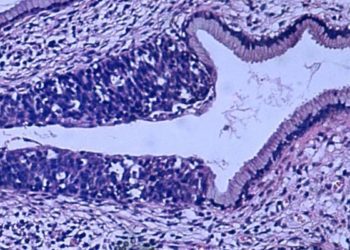Pembrolizumab associated improved survival for NSCLC compared to platinum-based chemotherapy
1. Progression free survival and overall survival was significantly increased in patients who received pembrolizumab vs. patients who received platinum-based chemotherapy.
2. Treatment related toxicities were nearly doubled in the chemotherapy group vs. the pembrolizumab group.
Evidence Rating Level: 1 (Excellent)
Study Rundown: Pembrolizumab is a humanized monoclonal antibody against programmed death ligand 1 (PD-L1). A substantial proportion of patients with advanced non-small-cell lung cancer (NSCLC) have high levels of membranous PD-L1 expression, and therefore multiple iterations of the KEYNOTE studies have sought to investigate the role of pembrolizumab in the primary treatment of NSCLC.
In this study, subjects with previously untreated NSCLC were randomly assigned to receive either pembrolizumab or platinum-based chemotherapy (most commonly carboplatin plus pemetrexed). The primary end point of the study was progression-free survival. Secondary endpoints included overall survival, objective response rates, and safety. There was a significant increase in the primary end point for the pembrolizumab group vs. the chemotherapy group. This was also demonstrated for the secondary outcomes of overall survival and objective response rate. The proportion of treatment associated toxicities was nearly double in the chemotherapy group. This study draws strength from its rigorous inclusion and exclusion criteria that included both clinical and molecular genetic characteristics.
Click to read the study, published today in NEJM
Relevant Reading: Pembrolizumab for the treatment of non–small-cell lung cancer
In-Depth [randomized controlled trial]: A total of 305 patients were randomly assigned in a 1:1 ratio to the pembrolizumab group (n = 154) or the chemotherapy group (n = 151). The median duration of follow-up was 11.2 months (range 6.4 to 19.7 months). The median time to reach the primary outcome, progression-free survival, for the pembrolizumab group was 10.3 months (95%CI 6.7 months to not reached) vs. 6.0 months (95%CI 4.2 to 6.2 months) in the chemotherapy group. For overall survival at 6 months, this was found to be 80.2% (95%CI 72.9 to 85.7%) in the pembrolizumab group and 72.4% (95%CI 64.5 to 78.9%) in the chemotherapy group (HR 0.60; 95%CI 0.41 to 0.89; p = 0.005). Objective response rate was 44.8% (95%CI 36.8 to 53.0%) in the pembrolizumab group and 27.8% (95%CI 20.8 to 35.7%) in the chemotherapy group. Grade 3, 4, or 5 adverse events occurred in 53.3% of the chemotherapy group and 26.6% of the pembrolizumab group.
Image: PD
©2016 2 Minute Medicine, Inc. All rights reserved. No works may be reproduced without expressed written consent from 2 Minute Medicine, Inc. Inquire about licensing here. No article should be construed as medical advice and is not intended as such by the authors or by 2 Minute Medicine, Inc.







